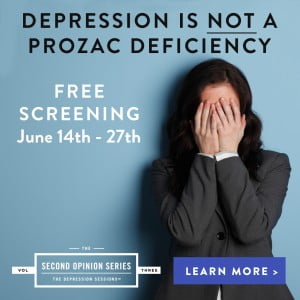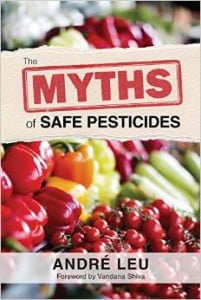
by Joanie Blaxter, founder of Follow Your Gut
As I said in last week's post, it was two steps forward, one step back, but within a few months of beginning a nutritional supplement protocol for pyroluria, I saw about a 75% reduction in my symptoms of anxiety, depression, sleep disorder, and chronic fatigue. And let me tell you, that shift was life-changing! For more on that story, go to part 1: Understanding Anxiety and Depression: Pyroluria, The Hidden Cause Your Doctor Doesn't Know About.
Nevertheless, even with a very careful traditional foods/low-allergen diet in combination with my supplementation, while I noticed an improvement, it was not a full resolution of my low spirits. In fact, three years later, in the winter of 2013-14, the depression, clearly linked with anxiety, became noticeably worse. That worsening peaked a few months later on April 1 (Hah! the April Fools' Day I'll never forget!) when I had a panic attack at work so severe I had to go home.
How did I channel my anxiety? I went online, of course, and began searching frantically for a solution to my disorder.
Bizarrely enough (Thank you God! I am so blessed!) the answer had arrived in my inbox that very day! It was from a 7-part series of Price-Pottenger Nutrition Foundation blog posts on the work of Dr. William Walsh on how to use nutritional supplementation to treat mental illness entitled “Treating Mental and Behavioral Disorders with Nutrient Therapy.”
“Dr. Walsh has discovered, through working with thousands of mentally ill patients, that once a patient begins partaking of a traditional diet, nutrient imbalances can be identified and restored. Dr. Walsh’s remarkable work has allowed many patients to be successfully removed from drugs with uncomfortable side effects, using his nutrient therapies.”
Based on 3600 cases of diagnosed clinical depressives studied by the Walsh Research Institute, here is a nutshell of the…
5 Types of Depression According to Dr. William Walsh
- Pyrrole Disorder Biotype: 11% of the general population and estimated to affect anywhere from 40-70% of depressives; genetic condition in which too many pyrroles are retained in the body leading to a B6 and zinc deficiency which, in turn, creates a serotonin deficiency; only somewhat responsive to SSRI antidepressants.
- Copper Overload Biotype: around 17%; retains too much copper in the soft tissues of the body; vast majority are women who have hormonal imbalances and this imbalance shows up particularly as a postpartum depression or psychosis; probably the easiest patients to treat, even if they have suffered from the disorder for 20 years.
- Low-Folate Biotype: about 20%; genetic inability to convert folic acid to folate which is the only form the body can absorb; tends to have high level of chemical and food allergies; their depression comes in conjunction with anxiety often characterized by panic attacks; usually get worse on SSRI's.
- Under-Methylation Biotype: 38-40%; tends to have seasonal allergies and hay fever; mostly genetic, i.e. these people are born with a predisposition to depression; most difficult to treat with a nutrient-based approach in that noticeable effects can take up to a month, but Walsh's success rate is probably 65 to 70%.
- Toxic Overload Biotype: about 5%; usually lead, mercury or cadmium toxicity; this type of depression or psychosis often will show up after unknowingly being exposed to an environmental toxin for example, an old house with lead paint.
I had to take my head off my desk after reading this list. It looked to me as though I fit not just one, but probably three of Dr. Walsh's biotypes for depression/anxiety: pyrrole disorder, copper overload and low-folate biotype. (In fact, later testing also revealed lead poisoning and I personally HIGHLY recommend heavy metal testing. Turns out lead toxicity is actually fairly common, but you never know for sure without testing.)
Was there no hope for my full recovery?
- First of all, I knew I was a PYRROLE DISORDER BIOTYPE and already in treatment for that (Understanding Anxiety and Depression: The Hidden Cause Your Doctor Doesn't Know About (Part 1).
- In addition, as an ex-vegetarian of 29 years, I was also quite positive that I was also a COPPER OVERLOAD BIOTYPE. This is not a inherited genetic condition, per se, but rather one that results largely from how the environment and diet affects the adrenal glands. Once the adrenals become compromised, they cease being able to handle metals in the body effectively and, characteristically, begin storing copper in the soft tissues, particularly the liver and brain, rather than appropriately excreting it from the body.
According to my practitioner, virtually all long term vegans and vegetarians have an excess of copper stored in the body.
This is related to how the characteristically low levels of zinc and protein of a vegetarian diet, among other stressors, can compromise these critically important organs.
But, luckily, in terms of this condition, I was already working with a practitioner whose approach focused on detoxing excess metal from the soft tissues through hair analysis in conjunction with a targeted nutritional protocol.
- However, what really caught my attention was the LOW-FOLATE BIOTYPE because that biotype person is described as having a high number of allergies along with anxiety and depression that characteristically appear together. That described me!
This genetic biotype cannot convert the artificial form of folic acid over to folate, the natural form used by the body. The artificial form, unfortunately, is what's used in virtually all nutritional supplements.
I checked all my vitamin bottles. Bingo! All of them listed folic acid and not a single one contained folate.
Next I found an article from Psychology Today, “Depression Won't Go Away? Folate Could Be the Answer.” which suggested a dosage of 1500mcg of folate daily to resolve depression.
I immediately bought a bottle of folate and since the tabs were 800 mcg each, began taking them twice a day. Eureka! Once again, my symptoms of depression/anxiety substantially reduced within a couple weeks and I've not had another panic attack in over a year.
 (Note: Depression and anxiety are virtually never resolved through a one-trick approach.)
(Note: Depression and anxiety are virtually never resolved through a one-trick approach.)
Wow, I thought, How bizarre! Could I possibly have not just one genetic marker (pyroluria) for depression/anxiety, but two (low-folate biotype)???
At least I thought it was bizarre… until I began doing more research.
The next article I found which really blew my mind on the subject appeared a few months later from the Alliance for Natural Health – USA:
Many individuals have a genetic defect that prevents them from producing the enzymes needed to convert synthetic folic acid into the active form of the B vitamin that our bodies need. This includes up to 44% of North American Caucasians and over 50% of Italians, and over 90% of patients who are predisposed to diseases such as cancer, heart disease, and autism.”
Reading that paragraph, I was gob-smacked!
Nearly half the White population of North America is prone to Depression/Anxiety from a Genetic Folate Deficiency?
Did you catch the last part of that quote above: “… and over 90% of patients who are predisposed to diseases such as cancer, heart disease and autism.”
Do you have cancer or heart disease in your family background? Many people would answer, “Well, who doesn't?” Then chances are over 90% that you carry this genetic deficiency!
In other words, the folate biotype genetic marker occurs in conjunction with nearly all of our most out of control, skyrocketing diseases and psychological conditions: depression, anxiety, cancer, heart disease, autism, etc.
All of a sudden, it didn't look so unusual to me that one could have two or more genetic markers for depression and/or anxiety.
I was talking with a friend about this bizarre anomaly and we agreed that we couldn't believe that our ancestors from 50-100-200 years ago had this same level of dysfunctional genes, that these genetic defects must be relatively new. If so…
What are we exposed to now that is so damaging our genetic material which didn't exist in our relatively recent past?
Actually that's a pretty easy answer in my book. For example, statistically, what else are cancer, heart disease and autism highly associated with, besides the low-folate genetic marker?
Exposure to industrial chemicals, notably agricultural ones, and particularly the world's most widely used herbicide, glyphosate (Monsanto's Roundup). (source: CHAMACOS Study: Even Tiny Amounts of Pesticides May Harm Kids' Brains)
I believe beneficial genes, that were previously intact, are now becoming damaged by industrial chemicals and creating chromosomal defects…
resulting in conditions like the low-folate biotype, and pyroluria… and more.
For example, look at the eye-opening conclusion of researchers on the damage that this agricultural chemical has already done to genes even though we haven't been exposed to it for over ten years.
No one's used the pesticide Methoxychlor for more than a decade — but according to a new study, it may be harming people for generations to come.
“A group of researchers at Washington State University have discovered new effects from the pesticide that reach into a subject's epigenome, affecting children and even grandchildren of the initial subject.
“That ancestral exposure can contribute to adult onset kidney disease, ovarian disease, and obesity in later generations.” (my emphasis)
Pesticide Linked to 3 Generations of Genetic Damage
Anyone who doubts that the consumption of genetically engineered foods is connected to the rise in autism
…should look at the graph shown by Dr. Stephanie Seneff, Senior Researcher from MIT, in the video below: Seeds of Truth. Go to the 50:00 minute mark.
The correlation of the rise of autism with the increased rate of glyphosate as applied to genetically engineered corn and soy (present in virtually all processed foods) is almost a perfect match.
That virtually never happens in correlative statistics!
Personally, I feel there is enough mounting evidence of genetic damage caused by industrial poisons that I will continue to eat as close to 100% organic as I can, while also educating myself about how to reduce my exposure to chemicals in my environment. I have direct, personal experience that genetic dysfunction can be compensated for with a nutrient-dense diet in combination with a targeted nutritional supplementation protocol.
- I highly recommend the new, clear and very accessible book, The Myths of Safe Pesticides by Andre Leu.
- Remember to read part-1 here: Understanding Anxiety and Depression: Pyroluria, The Hidden Cause Your Doctor Doesn't Know About.
- And this one: How to Fight Depression and Anxiety Naturally: 20 Helpful Tips for Anxiety, Depression, and Fatigue
 This was a guest post by my sweet friend, Joanie Blaxter, who is now a regular writer around here! She’s been the Ventura County, California chapter leader of the Weston A. Price Foundation since 2010, and you can contact Joanie here for health consultations. Also, find all her past posts here.
This was a guest post by my sweet friend, Joanie Blaxter, who is now a regular writer around here! She’s been the Ventura County, California chapter leader of the Weston A. Price Foundation since 2010, and you can contact Joanie here for health consultations. Also, find all her past posts here.
Disclaimer: neither Joanie nor I are health professionals! Use what you read here as part of your own research and then consult with a natural-minded doctor or health professional you trust to find what is best and right for YOU. Read my entire disclaimer here, and also note that there may be affiliate links in this post.




Joanie Blaxter says
Hi Hannah, This is Joanie Blaxter who wrote the article for my weekly column with Kelly. For more info on how I got diagnosed, go to my posting from last week (also listed at the beginning of this week’s article): https://kellythekitchenkop.com/understanding-anxiety-and-depression-part-1/. Good luck! And let me know if you need any more info.
Hannah says
Hey Kelly,
I’m so glad you’re talking about this important subject that affects so many of us, myself included! Who did you see that helped you determine your deficiencies? I’ve been taking different supplements but feel I’m more guessing than anything and would love to be able to really pinpoint what I actually need! Thanks:)